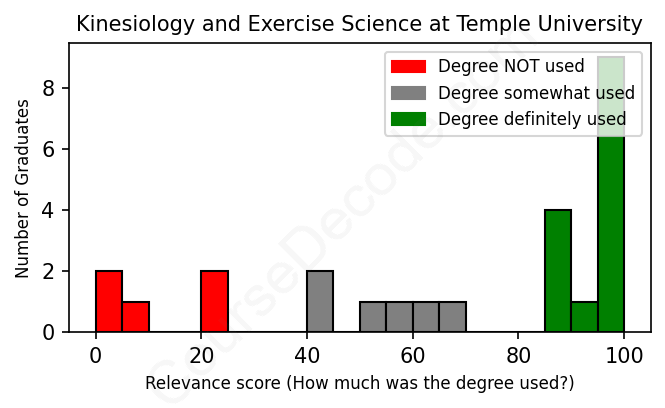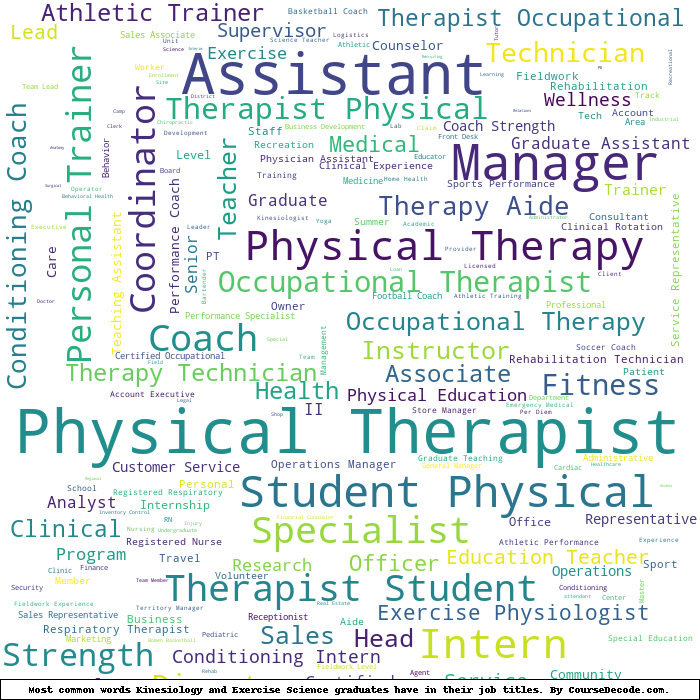
First, some facts. Of the Kinesiology and Exercise Science graduates from Temple University we've analyzed , here's how many have used (or NOT used) their degree in their career:

These are estimates based on AI analysis of 25 LinkedIn profiles (see below).
The verdict? Slightly above average. Overall, with an average relevance score of 68%, Kinesiology and Exercise Science graduates from Temple University have a slightly higher likelihood (+1%) of finding work in this field compared to the average graduate across all fields:
And for comparison, here's the chart for all profiles we've looked at across all degrees.
Also, after graduating, 64% of these graduates have pursued further education other than another Bachelor's degree (such as a Masters degree or other), compared to the average across all profiles of 35%. This suggests you may need more than just a Bachelors degree to be competitive as a Kinesiology and Exercise Science graduate.
See the details:
|
Relevance score: 24% We think this person has NOT gone into a career related to their degree. We think this person has NOT gone into a career related to their degree.
DEGREE INFOGraduated in 2012 from Temple University with a Bachelor of Science (B.S.) in Kinesiology and Exercise Science. No other secondary education since. JOB HISTORY SINCE GRADUATIONInternet Sales Rep, Financial Coordinator & Marketing/Web Coordinator Coopersburg & Liberty Kenworth Sep 2013 - Oct 2014 Medical Scribe  The Children's Hospital of Philadelphia Apr 2015 - Sep 2016 Sales Representative  Osteo Solutions Sep 2016 - Apr 2018 Sales Representative  Globus Medical Apr 2018 - May 2021 Product Integration Coordinator  ChristianaCare & Clinergy GPO May 2021 - Sep 2021 Strategic Partnerships and Sourcing Manager  ChristianaCare & Clinergy GPO Sep 2021 - Jun 2022 Director Strategic Partnerships and Business Development  ChristianaCare & Clinergy GPO Jun 2021 - Present ABOUTNo information provided. |
The top 10 most common jobs done by the graduates we've analyzed (ranked most common to least) are:
When you dive into the job landscape for graduates of Temple University's Kinesiology and Exercise Science program, you see a pretty diverse range of career paths, but there are some clear trends. Many individuals have found positions as Personal Trainers and Physical Therapists, which directly utilize the knowledge they gained during their studies. These roles require a deep understanding of human movement, exercise principles, and rehabilitation techniques, making them a perfect fit for what they learned. There's a noticeable emphasis on health and wellness, particularly in roles that focus on helping others improve their physical well-being, like athletic trainers and physical therapists, which align well with their degrees.
However, not all jobs listed have a strong connection to Kinesiology and Exercise Science. Some graduates have ended up in seemingly unrelated fields like dentistry, property management, or sales roles, where the skills learned in their degree program aren't necessarily relevant. While this variety shows this degree has some flexibility, you'd see that a majority of the graduates stick closely to fields where their education is directly applicable, especially in roles related to fitness and rehabilitation. So overall, it seems like while there are a good number of relevant roles, there are definitely some graduates who veered off into other career paths that don't quite tap into their Kinesiology knowledge.
Here is a visual representation of the most common words in job titles for Kinesiology and Exercise Science graduates (this is across all Kinesiology and Exercise Science graduates we've analyzed, not just those who went to Temple University):

So, if you're checking out the career paths of Temple University graduates with degrees in Kinesiology and Exercise Science, you’ll see a mix of people doing really well in fields closely related to their studies and others who might have taken more winding roads. Right after graduation, many seem to land positions like personal trainers, physical therapists, or athletic trainers, which align perfectly with their degrees and give them solid entry points into the health and fitness industry. For instance, you have grads working as certified athletic trainers or jumping straight into physical therapy roles pretty soon after they finish school. This is a good sign that they’re using what they learned in school right away.
Fast forward five to ten years, and it seems like some of these Temple graduates are climbing the ranks in their professions while others have explored different careers that might not be directly related to exercise science. Many physical therapists have moved up to director or managerial roles, which showcases the advancement opportunities in that field. However, there are also those who have switched to completely different paths, like sales or education, suggesting that while the degree is beneficial, it might not be the only ticket to lasting success in the exercise science arena. Overall, it looks like a mixed bag, with lots of promising careers in health and fitness alongside some folks who've pivoted into unrelated fields. Still, it’s definitely a degree that gives graduates a solid shot at good careers right out of the gate.
Honestly, a Bachelor’s degree in Kinesiology and Exercise Science can be pretty manageable, especially if you’re into fitness and health. At Temple University, like most schools, you'll dive into topics like anatomy, physiology, and biomechanics, which can get tough but are super interesting if you enjoy learning about how the body works. The workload can vary, but you'll mostly find a mix of lectures, labs, and group projects. Some people find it easier than other science-heavy majors since it often focuses more on practical applications and less on hardcore math or chemistry. Of course, everyone's experience is different, but if you're passionate about the subject, it might feel more like a fun challenge than a grind!
Most commonly, in the LinkedIn profiles we've looked at, it takes people 4 years to finish a Bachelor degree in Kinesiology and Exercise Science.
Looking at these Temple University grads, it seems like there's a pretty wide range of earnings among them. For example, graduates working as physical therapists and dentists are likely raking in decent salaries, reflecting the high demand for those professions. On the other hand, some roles like personal trainers or recreation leaders usually don't pay as much, especially if they're still early in their careers or just freelancing. Plus, the folks who have been in school for years without a clear job trajectory, like the student at Bay Path College, might not be making any money at all, which obviously isn't great. Overall, it looks like some have landed well-paying gigs while others may still be working their way up the ladder. So, it's a mixed bag!
Here is a visual representation of the most common words seen in the "about" section of LinkedIn profiles who have a Bachelor degree in Kinesiology and Exercise Science (this is across all Kinesiology and Exercise Science graduates we've analyzed, not just those who went to Temple University). This may or may not be useful:

Here are all colleges offering a Bachelor degree in Kinesiology and Exercise Science (ordered by the average relevance score of their Kinesiology and Exercise Science graduates, best to worst) where we have analyzed at least 10 of their graduates: